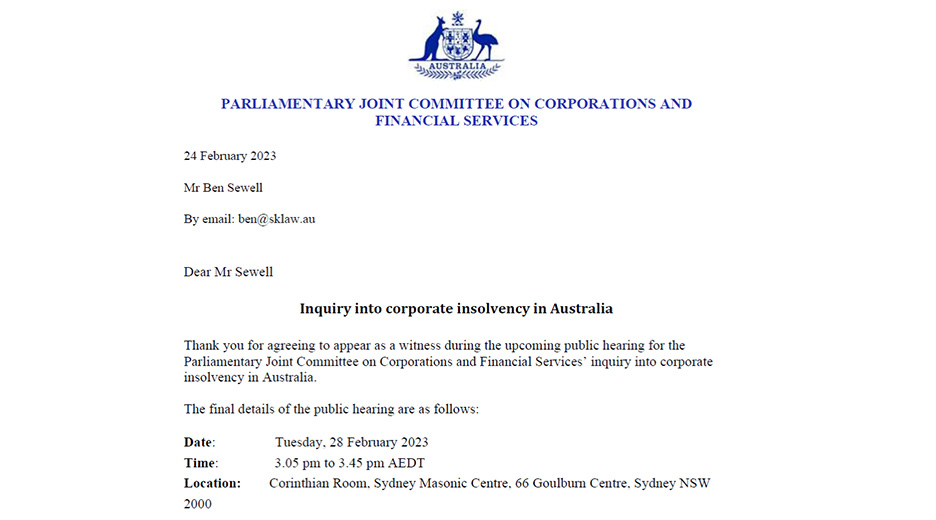Corporate Inquiry in Insolvency

On 28 February 2023 Ben Sewell of Sewell & Kettle Lawyers was invited to give evidence for the Parliamentary Joint Committee on Corporations and Financial Services’ inquiry into corporate insolvency in Australia.
The scope of the inquiry is quite broad, and it’s terms of reference include considering voluntary administration, liquidation, small business restructuring and professional regulation.
Before he was questioned by the parliamentarians, Mr Sewell made the following opening statement:
Chair: Thank you very much. I now invite you to make a short opening statement, and at the conclusion of your remarks I will invite members of the committee to ask questions.
Mr Sewell: Thank you for your invitation to give evidence. I am delighted to be here today, and I hope to be of service to the Commonwealth. I am giving evidence as a private citizen and I don’t represent any association. I have worked as an insolvency lawyer since 2004 and I have had my own practice for a number of years. The area that I specialise in is the insolvency of small to medium sized enterprises and I have acted for creditors, directors and also the insolvency practitioners. I have therefore been at the coalface of the insolvency industry and I have dealt with many of the practical issues that your committee is looking to understand.
Over my career I have seen changes to the nature of small business external administration, a change in culture of insolvency practitioners and also the implementation of significant reforms. I am very much an advocate for sensible reform based upon empirical evidence with a focus on the continual improvement of the system of corporate insolvency. In my submission I recommend 19 reforms. These reforms are significant, but I believe that these reforms are attainable. They are in the handout that I have provided, but I will not read them all out.
In my submissions I have been critical of (1) the stated purposes and objectives of our system of corporate insolvency; (2) voluntary administration as a restructure procedure for small to medium size enterprises; (3) the data available to evaluate the efficiency of the system of corporate insolvency; and (4) the regulation of insolvency practitioners. On the other hand, I have been very supportive of the small business restructuring process and other reforms such as the director identification number. I am happy to answer any questions that you have. Once again, thank you for your invitation to give evidence today.
Ben was asked by the committee about the effectiveness of voluntary administration, professional regulation of insolvency practitioners, future reform, phoenix activity and the small business restructuring process. It is expected that the inquiry will table its report by the end of May of 2023.
If you would like to learn more about the Inquiry you can look at the material on its website: https://www.aph.gov.au/Parliamentary_Business/Committees/Joint/Corporations_and_Financial_Services/CorporateInsolvency